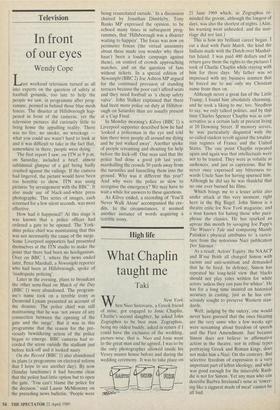Television
In front of our eyes
Wendy Cope
Last weekend television turned us all into experts on the question of safety at football grounds, too late to help the people we saw, in programme after prog- ramme, penned in behind those blue mesh fences. The disaster at Hillsborough hap- pened in front of the cameras, yet the television pictures did curiously little to bring home the appalling reality. There was no fire, no smoke, no wreckage — what you could see wasn't hard to look at and it was difficult to take in the fact that, somewhere in there, people were dying.
The first report I saw, on ITN at 9 p.m. on Saturday, included a brief, almost subliminal glimpse of a girl being badly crushed against the railings. If the camera had lingered, the picture would have been too horrible to show. ITN was using pictures 'by arrangement with the BBC'. It also made use of black-and-white press photographs. This series of images, each screened for a few silent seconds, was most effective.
How had it happened? At this stage it was known that a police officer had ordered a gate to be opened. The York- shire police chief was maintaining that this was not necessarily the cause of the surge. Some Liverpool supporters had presented themselves at the ITN studio to make the point that there had been no hooliganism. Over on BBC 1, where the news ended later, Peter Marshall, a Newsnight reporter who had been at Hillsborough, spoke of 'inadequate policing'.
Later in the evening, plans to broadcast the other semi-final on Match of the Day (BBC 1) were abandoned. The program- me's name took on a terrible irony as Desmond Lynam presented an account of the disaster. The police chief was still maintaining that he was 'not aware of any connection between the opening of the gate and the surge'. But it was in this programme that the reason for the pre- viously bewildering action of the police began to emerge. BBC cameras had re- corded the scene outside the stadium just before kick-off and it looked nasty.
On the Record (BBC 1) also abandoned its plans (a programme on electoral reform that I hope to see another day). By now (Sunday lunchtime) it had become clear that the police had little option but to open the gate. 'You can't blame the police for the decision,' said Laurie McMenemy on the preceding news bulletin, 'People were being resuscitated outside.' In a discussion chaired by Jonathan Dimbleby, Tony Banks MP expressed the opinion, to be echoed many times in subsequent prog- rammes, that 'Hillsborough was a disaster waiting to happen'. The focus was now on perimeter fences (the virtual unanimity about these made you wonder why there hasn't been a louder campaign against them), on control of crowds approaching matches, and on the question of fans without tickets. In a special edition of Newsnight (BBC 2) Joe Ashton MP argued for the continued provision of standing terraces because the poor can't afford seats and they need football as 'a cheap safety valve'. John Stalker explained that there had been more police on duty at Hillsbor- ough on Saturday than are usually present at a Cup Final.
In Monday morning's Kilroy (BBC 1) a Liverpool supporter described how he had 'looked a policeman in the eye and told him there were people all around me dying and he just walked away'. Another spoke of people screaming and shouting for help before the kick-off. One man said that the police had done a good job last year, marshalling the crowds 50 yards away from the turnstiles and funnelling them into the ground. Why was it different this year? And why were the police so slow to recognise the emergency? We may have to wait a while for answers to these questions.
As Kilroy ended, a recording of 'You'll Never Walk Atone' accompanied the cre- dits. In the circumstances, it seemed another instance of words acquiring a terrible irony.


































































 Previous page
Previous page